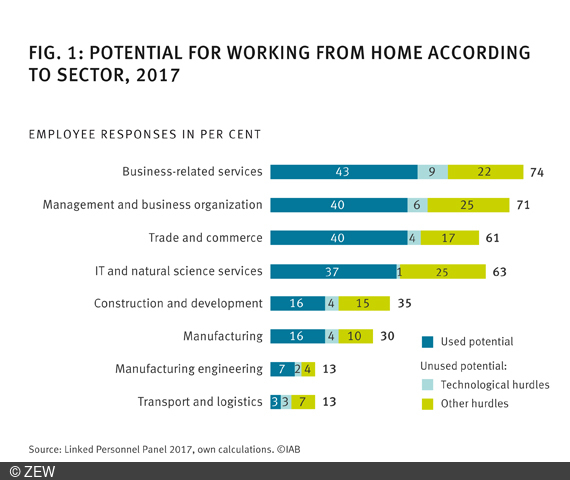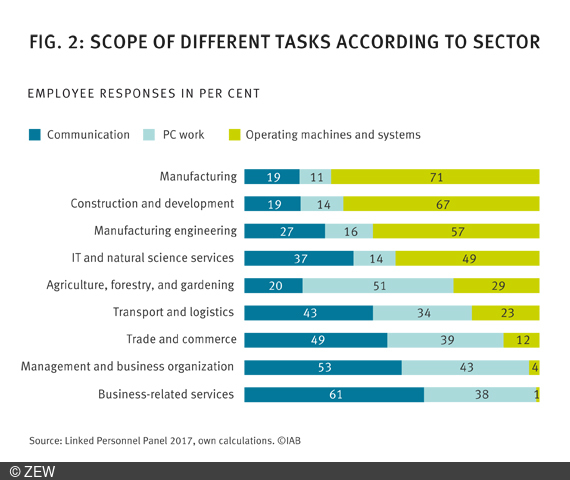Jobs in Germany With Unused Home Office Potential
ResearchZEW Expert Brief on Working from Home in Times of the Coronavirus Pandemic
A firm culture of presence is now giving way to social distancing in many German companies. Though the coronavirus crisis shows just how well working from home can function in Germany, it also shows the catching up that could be done. In almost all private sector companies to date, the potential for employees to work remotely has not yet been fully realised, especially in administrative professions, IT, natural sciences, and trade and commerce. These are the results of a ZEW expert brief from ZEW Mannheim together with the Institute for Employment Research (IAB).
The evaluation is based on data from the Linked Personnel Panel, comprised exclusively of private sector companies with at least 50 employees subject to social insurance contributions. In the ZEW expert brief, the researchers show which jobs have the potential to be done from home, provided that the remaining technological hurdles are removed.
Before the coronavirus crisis, more and more professionals were working in home offices. Depending on the type of work, however, remote work use varied greatly, and the potential for it was not fully utilised, as the ZEW expert brief shows. In all the professional groups studied, it was found that more people could work from home, provided that the job was suited to mobile office work and the right technology was available. Especially for job types in which the proportion of those working from home was already quite high, such as IT, natural sciences, and commerce, there was still considerable room for improvement in terms of exploiting work-from-home potential. This is especially true for traditional office jobs, where up to 30 per cent of employees could additionally be working from home.
The researchers also point out that the kind of job activity plays a central role when making use of remote work options. For example, the majority of employees in the companies surveyed worked in specialized jobs, with 23 per cent of employees working at least occasionally from home, while the proportion of employees with specialist or expert jobs who worked from home was more than twice as high at 61 per cent.
Potential for remote work dependent on a job tasks
The scope and structure of activities in the various job types also revealed the untapped potential of working from home, since the more time an employee was spending on home-office-related activities, such as communication or computer work, the greater the likelihood that the person could work from home. On the other hand, a higher proportion of work with machines and equipment was associated with a lower home-office probability. “A low potential for remote work is therefore found with professionals who work extensively with machines and systems. Professions in the fields of construction, development, and manufacturing, which are mainly dependent on the operation of machines and systems for carrying out their work, all fall into this category,” explains ZEW researcher Dr. Susanne Steffes. In contrast, occupations in business-related services, management, and business organisation and commerce showed comparatively high numbers of home-office-related activities.
“In Germany, there is still a lot of untapped potential for remote work that will certainly be used more in the coming weeks. This is highly dependent on one’s tasks, however. And where a lot of work is done with machines and systems, the tech hurdles remain relatively high,” explains Dr. Steffes. Dr. Stefanie Wolter from IAB points out that “this is also shown by current developments. Measures such as the closure of production plants due to the coronavirus pandemic may have an effect on office administrative jobs that could probably be done from home. Nonetheless, dismantling technological hurdles such as providing hardware, software, and ensuring sufficient broadband connection would definitely help keep the German economy up and running.”

